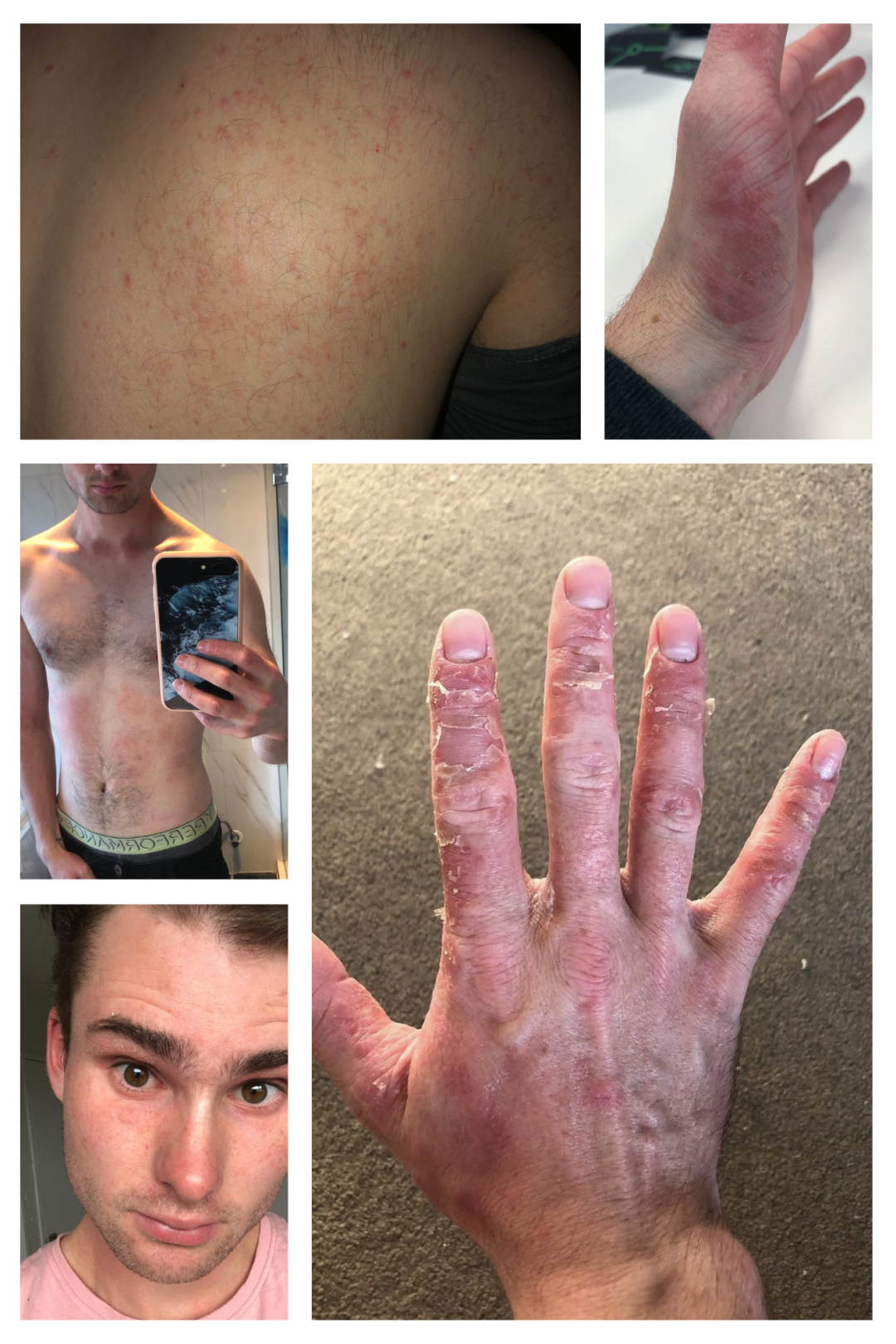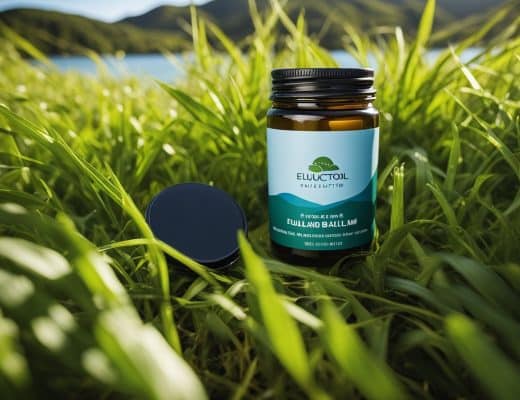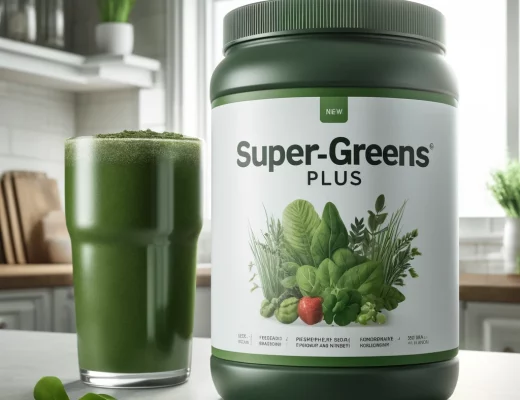You know that feeling where something’s been itchy for way too long and you’re thinking “man, I should probably get this checked out”? That was me three years ago when my eczema decided to make an unwelcome comeback. What started as a mild annoyance turned into absolute hell – especially when it came to something as basic as washing myself.
Let me tell you about the nightmare of trying to find a soap that doesn’t make your skin freak out. Regular soaps? They’re about as helpful as sandpaper. I’d spend endless nights scratching the ever-living hell out of my hands, promising myself “just one more scratch,” only to wake up barely able to move them. It’s a vicious cycle that really messes with your head after a while.
Those pictures you’re looking at? That was my reality. Even a simple lukewarm shower (RIP my beloved hot showers) felt like torture the moment water hit my cracked skin. And don’t get me started on doing the dishes – rubber gloves became my new best friend.
Quick note: I couldn’t make this stuff up if I tried. These are actual photos of my eczema journey, and yeah, it was as rough as it looks.
A game-changer in my daily routine was switching from regular soap to Pinetarsol. While it wasn’t my miracle cure (I’ll be straight up – medication was what really got my eczema under control), Pinetarsol made a massive difference in managing my daily symptoms. Unlike the harsh soaps I’d been using, it didn’t leave my skin feeling like the Sahara Desert. Finally, I could wash without making things worse!
Key Takeaways
- Traditional soaps can exacerbate eczema symptoms due to harsh chemicals.
- Pinetarsol serves as a gentler alternative that reduces itching and supports skin healing.
- Switching to suitable eczema soaps can improve overall quality of life.
Understanding Eczema

Eczema is a condition that can cause the skin to become red, itchy, and inflamed. It’s a challenge many of us face, but understanding the way it presents, what causes flare-ups, and its different forms can be key to managing it effectively.
Symptoms of Eczema
Eczema can result in skin that feels itchy and looks red, but symptoms may vary. One can experience:
- Dryness: The skin becomes scaly or rough.
- Itching: This can be mild or intense, often worsening at night.
- Inflammation: Redness and swelling are common.
- Rashes: Which may appear on the face, wrists, hands, or feet.
I’ve found that traditional eczema soaps in NZ could not alleviate my severe eczema symptoms, often leading to increased dryness and itching.
Causes and Triggers
Eczema triggers often include:
- Irritants: Like soaps, detergents, or shampoos.
- Allergens: Pollen, pets, dander, or dust mites.
- Microbes: Bacteria like Staphylococcus aureus, viruses, and certain fungi.
- Temperature: Hot weather, high and low humidity, and perspiration from exercise.
For me, identifying triggers was crucial, as most soaps, especially those with fragrances or harsh ingredients, aggravated my eczema.
Types of Eczema
There are several types of eczema:
- Atopic dermatitis: The most common form, usually hereditary.
- Contact dermatitis: Caused by skin reaction to a substance.
- Dyshidrotic eczema: More prevalent on the hands and feet where blisters form.
After years of frustration, I switched from soap to Pinetarsol. This gentler alternative has been transformative for my skin health, reducing itching significantly and aiding healing. My quality of life improved as I found relief from the constant irritation of eczema.
What Makes Eczema Soaps Unique

Eczema soaps are designed with specific needs in mind, focusing on soothing irritated skin and avoiding common triggers that may worsen eczema symptoms.
Soap Ingredients for Eczema
The ingredient list of a soap can either be a trigger for eczema flare-ups or a source of relief. Traditional soaps often contain harsh detergents, fragrances, and chemicals that strip the skin of its natural oils. This can lead to increased dryness and irritation. Eczema soaps, on the other hand, are thoughtfully formulated with the goal of nurturing sensitive skin. They usually exclude irritants like fragrances and sulfates.
During my journey with severe eczema, I found that soaps labeled “gentle” or “for sensitive skin” weren’t enough—my skin needed something more. That’s when I came upon emollient-rich options for eczema, which completely changed the game for me. Ingredients like colloidal oatmeal, glycerin, and ceramides found in these eczema-friendly soaps helped to reduce my skin’s dryness and calm the itching.
Switching to a soap-free option like Pinetarsol helped break the cycle of irritated, itchy skin that I was experiencing. This is because the right ingredients can help maintain the skin’s moisture barrier and support its healing, vastly improving the feel and health of the skin.
The Role of pH in Eczema Soaps
The pH level of a soap is a crucial factor for those with eczema. Our skin’s natural pH is slightly acidic, which helps to protect against harmful microbes and retain moisture. Many traditional soaps have a high pH level, making them alkaline, which can disrupt the skin’s natural pH balance. This disruption can lead to increased dryness and irritation—something I experienced firsthand before I understood the importance of pH balance in skincare.
When I switched to pH-balanced options like Pinetarsol, it made a significant difference to my skin’s condition. By choosing a soap that matched the natural acidity of my skin, I noticed less inflammation and reduced itching, a crucial step toward healing. I realized that the role of pH in eczema soaps isn’t just a detail—it’s central to their effectiveness. A well-balanced product can support the skin’s natural defenses and enhance its ability to repair itself, leading to a better quality of life for those with eczema.
Choosing the Best Eczema Soaps

Finding the right soap for eczema is crucial for maintaining healthy skin and managing symptoms. Certain soaps can aggravate conditions while others like Pinetarsol can significantly improve skin health.
Consulting with Dermatologists
I learned the importance of talking to dermatologists when seeking Best Soap for Eczema NZ. These skin experts pointed me towards options that were gentle and designed specifically for sensitive skin. My dermatologist recommended Pinetarsol, which was a game-changer for my severe eczema. It helped reduce the itching and inflammation that I struggled with daily.
Customer Reviews and Ratings
The experiences of others who’ve battled eczema can be enlightening. I spent hours reading through customer reviews and found that consistently high ratings often indicate a soap’s effectiveness for managing eczema symptoms. Through my research, I discovered that Pinetarsol was frequently mentioned for its soothing properties.
Eczema Soap Formulations
After trying many soaps, I realized the importance of a soap’s ingredients and formula. Soaps with harsh chemicals made my eczema flare up. However, Pinetarsol’s formulation seemed to be different—it didn’t just clean my skin; it made it feel better. The reduced itching allowed my skin to start healing, giving me an improved quality of life.
Using Pinetarsol, I’ve found that not all soaps are created equal when it comes to managing eczema. It’s about finding the one that works with your skin to not just clean but help heal.
Recommended Soaps for Eczema in NZ

Choosing the right soap can be a game-changer for managing eczema. Bars and liquids are the two main types that stand out for their skin-soothing qualities.
Top Bar Soaps for Eczema
Having used various bar soaps, I’ve found that most traditional ones are too harsh, often worsening my eczema. However, soaps like the 75% Olive Oil Soap changed my perspective. It caters specifically to sensitive skin and contains turmeric, which I noticed helped calm my inflammation.
Highlights:
- Olive oil base: gentle on the skin
- Turmeric: known for anti-inflammatory properties
Another remarkable product is Goat Milk Soap from Global Soap NZ. Its richness in goat milk provided my skin with the hydration it sorely needed, without any unpleasant after-effects like itching or redness.
Highlights:
- Goat milk: moisturizes and nourishes
- Creamy lather: doesn’t strip the skin of natural oils
Liquid Soaps and Cleansers
For years, I struggled with severe eczema, with regular soaps leaving my skin dry and irritable. My discovery of Pinetarsol was a significant turning point. This isn’t just another liquid soap; it’s more of a treatment cleanser that thoroughly cleans without irritating. Ever since making this switch, my skin health has dramatically improved.
Daily use helped lessen the constant itching, and over time, my skin began to heal. The comfort I’ve gained from this improved skin health has been immense, positively affecting my quality of life. It’s not often you find a product that provides relief from the first use.
Key Product:
- Pinetarsol: substantial reduction in itching and inflammation
Soap Alternatives for Sensitive Skin

Finding the best soap for eczema and psoriasis is a journey of trial and error. Traditional soaps often contain harsh detergents that can worsen sensitive skin conditions.
Oil-Based Cleansers
For years, my search for a soothing solution for my eczema led me to various options and disappointments as conventional soaps stripped my skin of its natural oils. They left me with that tight and itchy feeling no one enjoys. I found my haven in oil-based cleansers, which have the opposite effect. These products cleansed my skin without the harsh effects that traditional soap bars imparted. The oils in these cleansers not only clean but also hydrate, forming a protective barrier that helped to heal my eczema-patched skin.
- Benefits:
- Hydrates skin
- Protects the skin’s natural barrier
- Gentle on sensitive skin
Non-Soap Cleansers
It wasn’t until I discovered non-soap cleansers, including brands like Pinetarsol, that I truly noticed a difference in my skin health. The reduced itching was a relief I had almost given up on finding. Unlike the regular soaps that aggravated my skin, Pinetarsol offered a mild and effective cleanse, which played a significant role in my daily routine to manage eczema. My personal transformation was not unique; others often note the visible healing and improved quality of life that comes with reduced symptoms of eczema and psoriasis.
- Observations:
- Noticeably reduced itching
- Visible healing of eczema patches
- Enhanced overall skin health
Ingredients to Avoid in Eczema Soaps

Identifying the wrong ingredients in eczema soaps is as crucial to skin health as selecting the right moisturizer. Through firsthand experience, I’ve learned that what you cleanse with can make a significant difference in managing eczema.
Common Irritants
Fragrances: While the scent of a soap can be alluring, it’s often a primary irritant for sensitive skin. My discovery was that soaps marketed as ‘fresh-smelling’ can be deceptive foes.
Alcohols and Sulfates: These ingredients, particularly Sodium Lauryl Sulfate (SLS), strip away natural oils, leaving skin dry and vulnerable. My switch to soap alternatives free of SLS profoundly reduced my skin’s dryness.
Preservatives: Parabens and formaldehyde-releasing preservatives were once daily battles for my skin, introducing unnecessary chemicals that led to irritation.
Allergens and Harmful Compounds
Cocamidopropyl betaine: This cleansing agent, found in many soaps, became my enemy, fueling inflammation and itchiness until I recognized its harmful effects.
Propylene Glycol: A common moisture-carrying ingredient, propylene glycol, was in everything I used until I found it was aggravating my eczema.
Switching from traditional soaps to Pinetarsol, a tar-based solution, was a turning point in managing my severe eczema. I experienced less itching, better healing, and an overall improved quality of life. This transformation highlighted the importance of not only what I applied as a moisturizer but also what I used as a daily cleanser.
The Impact of Hard Water on Eczema
Having struggled with severe eczema, I discovered that traditional soaps often aggravated my skin condition. It’s no surprise, as hard water can make eczema worse. Soap already has a high pH, which can disturb the natural balance of the skin. When used in hard water, soap can bind to minerals and leave a residue. This residue was a nightmare for my eczema; it led to further dryness and irritation.
Then, I came across Pinetarsol, a gentler alternative. Unlike ordinary soaps, Pinetarsol helped manage my symptoms. Using this eczema-friendly soap made a noticeable difference.
- Itching: Reduced significantly, allowing my skin to heal.
- Healing: My skin began to recover from the inflammation caused by hard water.
- Quality of life: Improved as I was no longer constantly battling with irritated skin.
Switching to Pinetarsol, designed for skin like mine, and being mindful of the water quality in my home, transformed my skin health. My experience is backed by reports indicating that hard water may damage the skin barrier, making it crucial for those with eczema to consider water softening options or use products specifically formulated for hard water use.
For anyone in New Zealand dealing with eczema, seeking out a specialty product like Pinetarsol might be beneficial. It has been for me, and it’s worth considering, especially as we look at the full impact of hard water on already sensitive skin.
Maintaining Skin Moisture

Proper hydration of the skin is crucial in managing eczema, with specific moisturizers and cleansing alternatives playing a significant role.
The Importance of Moisturizing
For years, my daily battle with eczema was exacerbated by the use of traditional soaps. These soaps stripped my skin of essential oils, leading to increased dryness and itching. It wasn’t until I understood that maintaining skin moisture is more than a comfort—it’s a necessity for anyone with eczema—that I found relief. The relentless itchiness and dryness would ease only when my skin was adequately hydrated, something regular soaps could never achieve for me.
Best Moisturizers for Eczema
When I switched to using Pinetarsol, it was a game-changer. This soap alternative helped maintain my skin’s moisture without causing further irritation. The gentle, emollient nature of such cleansers alongside consistent use of moisturizers are central to managing severe eczema. They form a barrier, locking in moisture, which has allowed my skin to heal. The result was a significant reduction in itching, promoting better skin health and a marked improvement in my quality of life. My personal journey underscores the effectiveness of using the right products to keep the skin well-moisturized, which is something anyone with eczema should consider.
Natural Remedies and Soaps

Finding the right skincare products can be critical for managing conditions like eczema. I’ve experienced firsthand how certain soaps with herbal ingredients can soothe irritated skin.
Herbal Ingredients
Turmeric and Orange Soaps: I’ve noticed that soaps featuring turmeric can help with inflammation and scarring. The bonus of orange scent feels refreshing.
- Kawakawa-Based Products: The Kawakawa plant is a key part of traditional Māori herbal medicine, and it’s easy to see why. I’ve used products with Kawakawa that can relieve dry and itchy skin. You can find natural eczema care products that use this ingredient.
- Goatsmilk and Hemp Oil Soaps: Soaps containing goatsmilk and hemp oil are gentle and moisturizing, and I find them better for sensitive skin prone to eczema flare-ups.
Homemade Eczema Soaps
I’ve experimented with making my own eczema-friendly soaps, focusing on natural oils and fats that preserve the skin’s moisture barrier.
- Olive Oil Base: Starting with a base of olive oil is great since it’s known for its hydrating properties.
- Essential Oils: Adding essential oils like chamomile or lavender not only makes the soap smell good but also adds anti-inflammatory qualities.
After struggling with eczema for years, traditional soaps with harsh chemicals often left my skin raw. When I replaced my usual soap with Pinetarsol, a cleanser designed for sensitive skin, the difference was remarkable. The reduced itching and signs of healing genuinely transformed my quality of life. Through this journey, I found that the best soap for psoriasis and eczema isn’t always the one with the most powerful ingredients, but the one that works in harmony with the skin’s natural defenses.
Eczema Soap Usage Tips

Choosing the right soap can significantly impact managing eczema. Traditional soaps may aggravate the condition, while specialised products like Pinetarsol can offer relief. Through trial and error, I learned important usage tips for better results.
How to Properly Use
I discovered that using Soap for Eczema demands a gentle approach. Here’s my method:
- Wet skin with lukewarm water: Hot water can further irritate eczema.
- Apply a small amount: A little goes a long way with concentrated eczema soaps.
- Softly lather: Avoid scrubbing, as this can damage sensitive skin.
- Short exposure: Prolonged contact may be unnecessary and drying.
- Rinse thoroughly: This ensures no residue that might irritate the skin.
- Pat dry: Rubbing is harsh on irritated areas.
- Moisturize immediately: Hydrating the skin helps lock in moisture.
Through these steps, I noticed less itching and more healing. My skin started to feel better over time, and I could maintain my routines without the dread of exacerbating my symptoms.
When to Use
Eczema Soap NZ is better off used sparingly, and I find these times best suited:
- Post-exposure to allergens: Use after contact with known irritants.
- Twice daily: Morning and night can keep the skin clean without over-washing.
- After sweating: Sweat can be a trigger for an eczema flare-up.
Since replacing my regular soap with Pinetarsol, my skin health has transformed. I now align my soap use with these occasions, and the overall quality of life has seen a substantial uplift.
Where to Buy Eczema Soaps in NZ

In New Zealand, finding the right soap for eczema-prone skin can be a game-changer. Many traditional soaps contain harsh ingredients that can aggravate sensitive skin conditions. Eczema Soaps in NZ are specially formulated to avoid such irritants and focus on gentle, natural ingredients. From personal experience, I found that soaps like Clean Earth Soap not only soothe the skin but also help in reducing eczema-related discomfort. For those interested in purchasing these, a variety of options are available online and in stores.
- Online Stores: Websites like Clean Earth Soap offer a range of natural NZ made olive oil soap which is suitable for people dealing with eczema.
- Health Food Stores & Pharmacies: Sabun Natural Skincare is known for its olive oil soaps, beneficial for eczema relief. They are available at pharmacies and health food stores throughout New Zealand.
- Handmade Natural Soaps: Handcrafted soaps with unique ingredients such as turmeric can be found at 7th Cloud Soaps. Consider their 75% Olive Oil Soap if you’re looking for a product made with care for sensitive skin.
- Specialty Skincare Stores: Some stores focus on skin conditions, like Hemp Skincare NZ, which offers a Natural Eczema & Psoriasis Soap.
Through my journey, I discovered that switching to products like Pinetarsol from regular soaps made a significant difference. Not only did it help reduce itching, but it also facilitated healing. Using these tailored eczema soaps is more than changing a product; for me, it was a lifestyle adjustment that led to an overall improvement in my skin health.
Frequently Asked Questions

In this guide, we’ll navigate through helpful insights focusing on soaps curated for eczema management. These include top-rated options, essential soap ingredients, natural alternatives, and guidance for those facing both eczema and psoriasis.
What are the top-reviewed soaps for eczema available in New Zealand?
After struggling with severe eczema, I found that many commercial soaps didn’t provide relief. However, upon discovering products like Sabun Eczema Rescue soap, which has received positive feedback for its natural formulation, my journey to finding the right soap became hopeful.
Which ingredients should I look for in a soap suitable for eczema?
In my experience, ingredients that help maintain the skin’s natural oils are crucial. Harsh agents like sulphates can worsen eczema, so I always searched for soaps with gentle, moisturizing elements, as suggested by Nudi Point, which focus on the skin’s health first and foremost.
Are there any natural or homemade soap options effective for eczema sufferers in New Zealand?
I have found natural soap options, such as those using olive oil, can be quite soothing for eczema-prone skin. SoapNuts, for example, offers a natural and eco-friendly alternative that aligns with my own positive shift towards natural cleansers.
What soaps are recommended for both eczema and psoriasis conditions?
I learned that soaps which are kind to eczema are often also suitable for psoriasis. SoapNuts has been mentioned as a gentle option, and in my case, I discovered the dual benefits of such natural products, which helped me manage my symptoms more effectively.
How can I identify soaps that might trigger my eczema?
Understanding the triggers for your eczema is essential. I observed that soaps with fragrances and harsh chemicals often led to flare-ups. You should always look for soaps with simple, recognizable ingredients and do a patch test before fully incorporating them into your routine.
Is it safe to use commonly available bar soaps like Dove on eczema-prone skin?
While commonly available soaps such as Dove are marketed as ‘mild’, they weren’t suitable for my skin. Dove and similar brands often contain ingredients that strip away natural oils, exacerbating my eczema. I transitioned to using less foamy, more oil-based cleansers, like those recommended by KidsHealth, which provided more relief.





No Comments